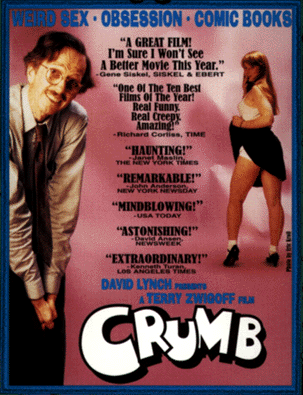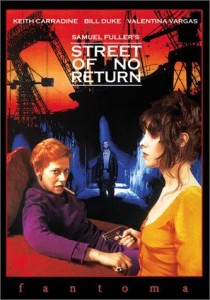From the Chicago Reader (June 2, 1995). This piece is quite separate from the essay I contributed to Criterion’s DVD of this film 15 years later. — J.R,

Crumb
Rating **** Masterpiece
Directed by Terry Zwigoff

Terry Zwigoff’s Crumb in many ways looks like conventional filmmaking, yet it conveys a remarkable fluidity and density of thought. It may resemble a biographical documentary — unobtrusively shot by Maryse Alberti, gracefully edited by Victor Livingston — but it unfurls like a passionate personal essay. The subject is Robert Crumb, America’s greatest underground comic book artist — little known to most people born much before or after 1943, the year of his birth, because he’s shunned the mainstream as a money-grubbing swamp. Zwigoff, an old friend, shot the movie over six years and edited it over three, and the sheer mass of this two-hour film seems partly a function of the amount of time he’s had to mull it over.
A member of Crumb’s former band, the Cheap Suit Serenaders, and a fellow collector of rare 20s and 30s blues and jazz records, Zwigoff has previously made documentaries only on musical subjects — blues artist Howard Armstrong in Louie Bluie, a history of Hawaiian music in A Family Named Moe. Read more
For viewers (and listeners) who feel that the great Dizzy Gillespie didn’t receive his due in Bird, this conventionally made but charismatic and enjoyable documentary by John Holland (1998, 85 min.) about the jazz trumpeter’s concert in Cuba, occasioned by the fifth International Jazz Festival of Havana, goes a long way toward making up the difference. Gillespie’s personality and music shine in this setting, and his contributions to Afro-Cuban music — including his association with Cuban drummer Chano Pozo and many of his best tunes in the 40s — are acknowledged in this congenial context. Fidel Castro makes a cameo. (JR) Read more
From the Chicago Reader (November 1, 1994). — J.R.

After the extensive recutting of his The Big Red One and the virtual shelving of his White Dog, American writer-director Sam Fuller reluctantly chose creative exile in Paris. In many ways the most elaborate and ambitious of his post-American features is this 1989 noir, an adaptation (by Fuller and producer Jacques Bral) of a David Goodis novel that was shot in Portugal. It stars Keith Carradine as a famous pop singer who winds up on skid row after he falls for a mysterious woman and gets his throat cut by her gangster boyfriend; much of the story is told in flashback after he’s arrested during a race riot. Recognizably (and enjoyably) Fuller-esque in its caustic violence, its punchy yellow-press dialogue, and its campy sensationalism, the movie is hampered — to the point of becoming weirdly discombobulated — by its use of Lisbon locations to stand in for American ones; the experience is every bit as disconcerting as Anthony Perkins’s American accent in Orson Welles’s version of Kafka’s The Trial. The singular vision of Fuller in his late 70s, tied as always to his passionate and radical view of the U.S., Read more



